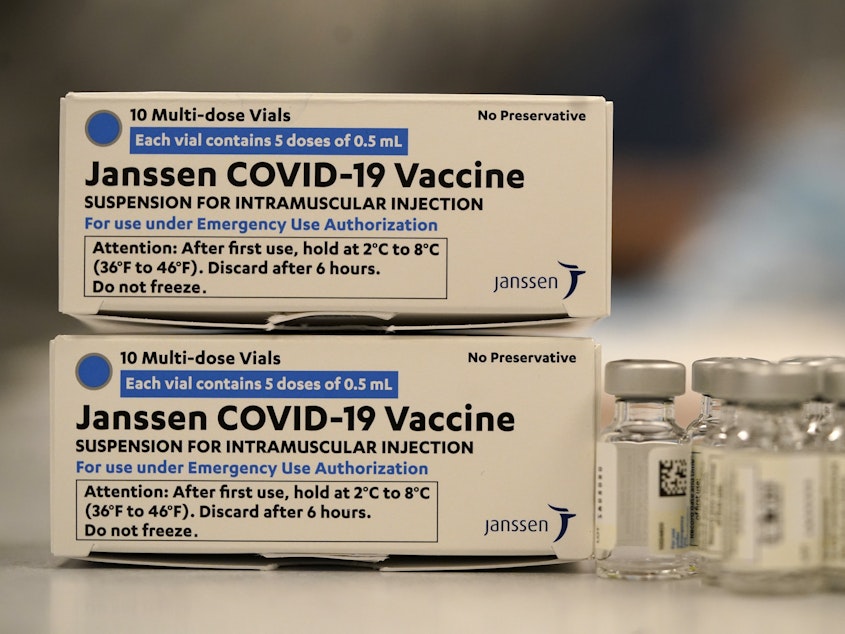U.S. Recommends Pausing Use Of Johnson & Johnson Vaccine Over Blood Clot Concerns

The U.S. Centers for Disease Control and Prevention and the Food and Drug Administration said Tuesday they are recommending a "pause" in the use of the single-dose Johnson & Johnson COVID-19 vaccine out of an "abundance of caution" while an investigation is conducted into reports of apparently rare, potentially dangerous blood clots.
Updated April 13, 2021 at 9:18 AM ET
In a joint statement on Tuesday, the two agencies said they are "reviewing data involving six reported U.S. cases of a rare and severe type of blood clot in individuals after receiving the J&J vaccine."
"In these cases, a type of blood clot called cerebral venous sinus thrombosis (CVST) was seen in combination with low levels of blood platelets (thrombocytopenia)," said Dr. Anne Schuchat, principal deputy director of the CDC and Dr. Peter Marks, director of the Food and Drug Administration's Center for Biologics Evaluation and Research. "All six cases occurred among women between the ages of 18 and 48, and symptoms occurred 6 to 13 days after vaccination."
"Right now, these adverse events appear to be extremely rare," the statement added.
Sponsored
Schuchat and Marks recommended that individuals who had already received the Johnson & Johnson vaccine who experience severe headache, abdominal pain, leg pain, or shortness of breath within three weeks of getting the shot contact their health care provider.
Johnson & Johnson did not immediately respond to an email from NPR for comment on the announcement. The company told The Associated Press that it was aware of the reports, but said that "at present, no clear causal relationship has been established between these rare events and the Janssen Covid-19 vaccine." Janssen is a Johnson & Johnson subsidiary.
More than 6.8 million doses of the Johnson & Johnson vaccine have already been administered in the U.S., alongside tens of millions of doses of vaccines produced by Pfizer-BioNTech and Moderna. The Johnson & Johnson vaccine received FDA emergency authorization for distribution in February.
Similar concerns over rare blood clots have been raised over the Oxford-AstraZeneca vaccine, which has been widely administered in the U.K., European Union and many other countries. Last week, the European Union's drug regulator said the benefits of the vaccine outweigh its risks.
The recommended pause in U.S. inoculations using the Johnson & Johnson vaccine is likely to further complicate the immunization drive against COVID-19, which has killed more than 562,000 in the U.S., amid an uptick in new coronavirus infections and "vaccine hesitancy" among certain groups.
Sponsored
Tuesday's statement said that the CDC would convene an advisory committee on Wednesday to "review these cases and assess their potential significance." The FDA is also investigating the cases. The agencies said until the further review is complete, "we are recommending a pause in the use of this vaccine out of an abundance of caution."
Amid manufacturing issues at a facility in Baltimore, Johnson & Johnson has had difficulty ramping up production. It has promised to deliver 100 million doses of its vaccine to the U.S. government by the end of May. [Copyright 2021 NPR]



